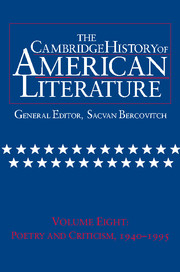Book contents
- Frontmatter
- Introduction
- Poetry, Politics, and Intellectuals
- Criticism since 1940
- Introduction
- 1 Politics and American Criticism
- 2 The Emergence of Academic Criticism
- 3 The Nationalizing of the New Criticism
- 4 The Canon, the Academy, and Gender
- 5 Deconstruction and Poststructuralism
- 6 From Textuality to Materiality
- 7 Cultural and Historical Studies
- Conclusion: Academic Criticism and its Discontents
- Appendix II: Biographies of Critics
- Chronology 1940–1995
- Bibliography
- Index
5 - Deconstruction and Poststructuralism
from Criticism since 1940
Published online by Cambridge University Press: 28 March 2008
- Frontmatter
- Introduction
- Poetry, Politics, and Intellectuals
- Criticism since 1940
- Introduction
- 1 Politics and American Criticism
- 2 The Emergence of Academic Criticism
- 3 The Nationalizing of the New Criticism
- 4 The Canon, the Academy, and Gender
- 5 Deconstruction and Poststructuralism
- 6 From Textuality to Materiality
- 7 Cultural and Historical Studies
- Conclusion: Academic Criticism and its Discontents
- Appendix II: Biographies of Critics
- Chronology 1940–1995
- Bibliography
- Index
Summary
Though deconstruction, like feminism, is only secondarily a form of literary criticism, it too has posed a fundamental challenge to the institutionalization of academic literary criticism recounted in our second and third chapters. That process of institutionalization assumed that literature possessed unique qualities that distinguished it as literature from other forms of communication. It was this idea of “literariness” that justified the special disciplinary status of literary study as an academic department and field, whose objectivity and rigor were buttressed by frequent recourse to the language of scientific inquiry.
Whether one followed Northrop Frye, who claimed to uncover universal underlying archetypes of literary art and human imagination, or various New Critics who claimed to discover the defining structural principles of all poetry worthy of the name, the need for autonomous departments of literature seemed clear. The same need was indicated for different reasons, if one worked in literary history, by the presumably organic unity of national literary traditions such as that of the United States. Feminism, deconstruction, and the broader movement called poststructuralism, we suggested, all challenge these unitary images both of texts and of national literatures that have justified the disciplinary isolation of literary studies.
In each case, the identity in question (of integral literary work, national traditions, or academic departments) depends on a boundary distinction between an outside and an inside, which these new movements call into question. Just as feminism challenged the assumption that sexual power relations are outside literature (and therefore may be properly relegated to sociology departments), deconstruction has challenged the assumption that philosophical questions are properly outside literature – even as it has challenged the assumption of philosophy departments that the study of metaphor, rhetoric, and other literary concerns are outside, or merely tangential to, philosophy.
- Type
- Chapter
- Information
- The Cambridge History of American Literature , pp. 354 - 388Publisher: Cambridge University PressPrint publication year: 1996

